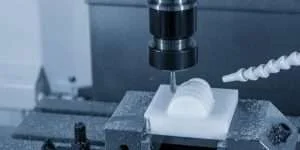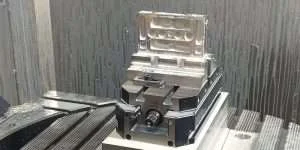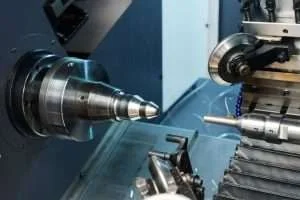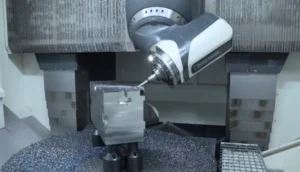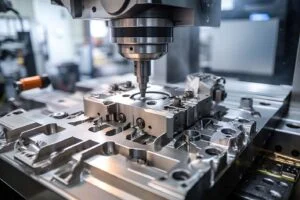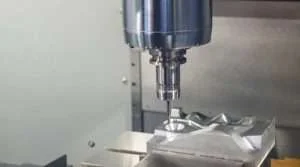With a wide range of plastic materials saturated in the industry, Machining Delrin, commonly known as acetal, belongs to the acetal group of plastics and is the ideal material utilized in a section of machining applications. When it comes to plastic CNC machining, Delrin’s success can be attributed to its remarkable properties, which include high rigidity, and adaptability. This article provides insights into machining Delrin.
What is Machining Delrin (POM)?
Delrin or Polyoxymethylene (POM) is a distinct type of acetal resin that offers exceptional dimensional stability, high strength, and low friction. It is a semisynthetic homopolymer of acetal, used in producing various precision parts.
It is mechanically stronger and possesses higher stiffness than other engineering thermoplastics. This feature allows it to maintain a strong form at low and high temperatures. Machining Delrin can be used by several processing methods, such as CNC machining, injection molding, and 3D printing, to produce the desirable parts.

Mechanical Properties of Delrin
Delrin possesses certain unique properties that offer it applications in various fields. Knowledge of these properties is key to understanding how to machine Delrin. They include:
Mechanical Strength
One unique feature of Delrin is its tensile strength, which is the level of stress the material can withstand before breaking under tension. It has a remarkable tensile strength between 7,000 and 9,000 PSI, making it less dense than metals.
Moisture Resistance
Delrin exhibits low water absorption even under long exposure to humid environments. In essence, it helps maintain good dimensional stability and high stiffness, as well as prevents swelling or warping of the material due to moisture absorption. Therefore, as an acetal polymer, Derlin can be used to make automotive components such as window regulators, handles, and interior trim pieces.
Thermal Properties
During plastic fabrication, this material has a relatively high melting point and excellent heat resistance. It withstands temperatures up to around 120°C (248°F) without significant deformation.
Why use Delrin for Your CNC Plastic Parts?
Standard Delrin makes a good substitute for metals, especially in creating corrosion-resistant and quality CNC plastic parts. Aside from its excellent mechanical properties, there are other reasons why Delrin should be ideal for the CNC fixtures plastic part.

Material Accuracy
Delrin’s mechanical properties ensure a highly consistent pattern during machining. For instance, If the designs are simple, it is easy to machine them with tolerances as small as “±0.005mm″.
With the correct geometry and sharp cutting-edge tools, machinists and engineers can optimize cutting parameters and tool paths to improve productivity.
Low Cutting Forces
This acetal’s relatively low cutting forces contribute immensely during machining processes. The outcome results in a reduction of wear and tear on the CNC prototype machining components, and a decrease in maintenance requirements.
Tool Wear
Delrin is relatively soft when compared to metals, so it causes less tool-cutting wear. This results in reduced tool changes and overall machining costs.
Grades of Delrin Used in Machining
In machining Delrin, acetal can be formulated into different grades to enhance its features in achieving desirable results. Some of the common grades of Delrin used for making plastic prototypes include:

Delrin 150
Delrin 150 is an acetal homopolymer with high thermal resistance, stiffness, and strength. This grade of Machining Delrin is commonly used in automotive, healthcare, and consumer goods sectors to make fuel system components, dental instruments, and kitchen utensils due to its durability, resistance to moisture absorption, and fatigue resistance.
Delrin AF
Delrin AF, also known as Delrin Antifriction, has applications where low friction and wear resistance are important. The self-lubricating nature of this plastic means that it doesn’t require oil or grease lubricants, making it suitable for industrial and laboratory applications, thereby improving the longevity of mechanical systems. This Delrin plastic is used in making gears, wear strips, bearings, and electrical components.
Glass-filled Delrin
One of the famous grades of plastics in Delrin CNC aluminum machining is the glass-filled Delrin or Delrin 570. This acetal contains powdered glass fibers, which improves its strength, dimensional stability, wear resistance, and stiffness substantially. Also, manufacturers appreciate this material because of its exceptional impact and chemical resistance, making it suitable for manufacturing machine parts and electrical components.
Challenges in CNC Machining Delrin
When developing components for Machining Delrin, it is important to take cognizance of the restrictions that make this material unsuitable for certain applications. These challenges include:
Highly Flammable
As an acetal, this material is highly flammable. It is not self-extinguishing, and cannot be combined easily with flame-proof additives like bromine and chlorine. This is because of its violent reaction to these additives, making it not an ideal choice for most electrical appliances.

Extremely Difficult to Bond
Since this acetal possesses good resistance to various chemicals, it is challenging to bond parts together, especially when using adhesives. In recent times, adhesives like epoxies and polyurethane have been known to bond CNC Machining Delrin materials. However, these bonds achieve minimal results and usually require the services of an expert, which is costly.
Heat Sensitive
Machining Delrin parts have good heat resistance. However, it will deform when exposed to high temperatures and may even melt. This is a major limitation compared to plastic parts like polyethylene and nylon. In Nylon vs. Delrin, heat resistance is one distinguishing factor, as nylon has a higher thermal resistance than Delrin.
Design Tips and Practices for Machined Delrin Parts
When using Delrin CNC machining, the high availability of this material makes it cut and create shapes into desired forms. Below are some design tips and practices for machined Delrin parts.
Tool Selection
When machining Delrin, it is important to use sharp cutting-edge tools with clearance like cemented carbide or high-speed steel as this helps to cut the material properly. Dull tools which scrape rather than cut will cause excessive heat. Also, tools without sufficient clearances for the ready removal of chips will cause the chips to bind and melt.
Speeds and Feeds
Since machining Delrin plastics have low melting points, it is crucial to use the right speed and feed to prevent overheating. When machining, begin with low cutting speed and feed rates and gradually increase until the desired product is obtained.
Clamping
Delrin has a low impact resistance, meaning it deforms easily under clamping pressure. Ensure the use of standard clamping methods like collets and chucks, or electric permanent magnetic clamps which will provide a secure grip between the work surface and tool, and also avoid extreme pressure that could cause distortion or warping during the Delrin CNC machining process.
Cooling
Delrin (POM) reacts poorly to temperatures above 121°C. To prevent overheating and maintain its dimensional stability, it is essential to use coolants or air blasts during the machining delrin process, as it helps to disperse heat and keep the material at a cool temperature.

Surface Finishing Options of Machined Delrin Parts
During Delrin CNC machining, the surface finishing of CNC plastic parts plays an important role in the product’s physical appearance by giving it a smooth and perfect look. Here are some surface finishing options to have a clean and flawless finish.
Bead Blast Finish
Bead blasting is a surface finishing method that involves the release of glass beads or fine particles using high pressure on the surface of the machined parts. This method cleans the surface of the CNC Machining Delrin parts and also improves the surface’s physical appearance, giving it a smooth, matte, or satin finish.
Polishing
Polishing is a surface finishing method that involves the use of abrasive materials to smoothen, enhance the appearance, and improve the texture of the material during machining Delrin. The process of polishing typically involves the gradual removal of surface imperfections, such as scratches, roughness, and unevenness. This is achieved by rubbing or buffing the surface with finer abrasives, such as sandpaper, cloth, or polishing compounds.
Applications of Delrin Parts
Machining Delrin material parts are largely used in a wide range of industries.
- Electrical Parts: Delrin is used to make switches, bobbins, connectors, audio and video cartridge platforms.
- Automobile parts: Derlinl is used to produce door lock systems, fuel pump units, and gears for windshield wipers.
- Consumer Goods Parts: Delrin parts are used to make clips, handles of appliances, zippers, and valves.
Alternative Methods for Processing Delrin
Delrin material is essential in CNC machining projects because it usually requires no special treatment when working with them.
While the traditional method of processing machining Delrin is effective, alternative manufacturing methods can be used to create Derlin parts.
3D Printing Delrin
3D printing Delrin is a process used in manufacturing three-dimensional solid objects from a digital file. In Delrin machining, this technology allows for the creation of unique designs with the ability to make them according to their specific requirements within a short time frame while also offering cost-saving benefits for small-batch prototypes. The downside of using 3D printing is that the size of the printer limits the number of items that can be produced, which will not be suitable for bigger projects.

Injection Molding Delrin
Injection molding is a manufacturing process used to make plastic parts in large quantities. This process involves injecting molten plastic material into a mold. Once the material melts, it is forced into the mold cavity, where it cools and solidifies into the desired shape. However, machining Delrin can be more expensive than other plastics used in injection molding.
Get Started with Delrin Projects at XinCheng
Xcmachining specializes in providing high-quality CNC machined parts and components to meet your specifications. Our advanced CNC machining magnesium capabilities ensure precision and cost-effectiveness in every part we create. Whether you need Delrin prototypes or custom parts for production, Xcmachining has the expertise and technology to achieve the best results for your projects. Contact us today to start your Delrin parts project, and let us deliver top-notch solutions that exceed your expectations.
Conclusion
In the acetal family of plastics, machining Delrin is the ideal material, which engineers and machinists largely appreciate for its excellent material performance and easy machinability. The flexibility of this material makes it a suitable choice for both small and large-scale production.
FAQs
Nylon vs. Delrin, which is the best?
The choice between Nylon or Delrin is based on the applications of the product. Generally, Nylon has a higher heat resistance than Delrin, making it suitable for environments with high heat requirements, while Delrin has lower moisture absorption than Nylon, allowing its application in damp environments.
Is Delrin a good alternative for metal?
Delrin is a good alternative for metal and this is because of its high tensile strength, low friction, moisture, and warp resistance. However, the specifications as well as usage of the machined parts, will decide if Delrin is a good alternative for metals.
Is it safe to use Delrin Plastic?
Delrin plastics are approved by the FDA and USDA as a food-grade product, making them safe to use.

